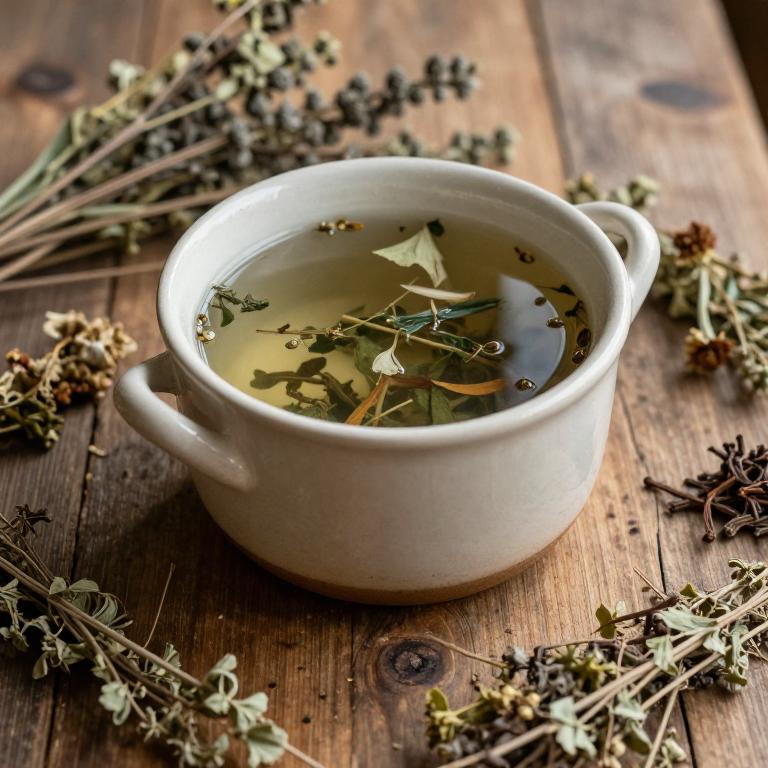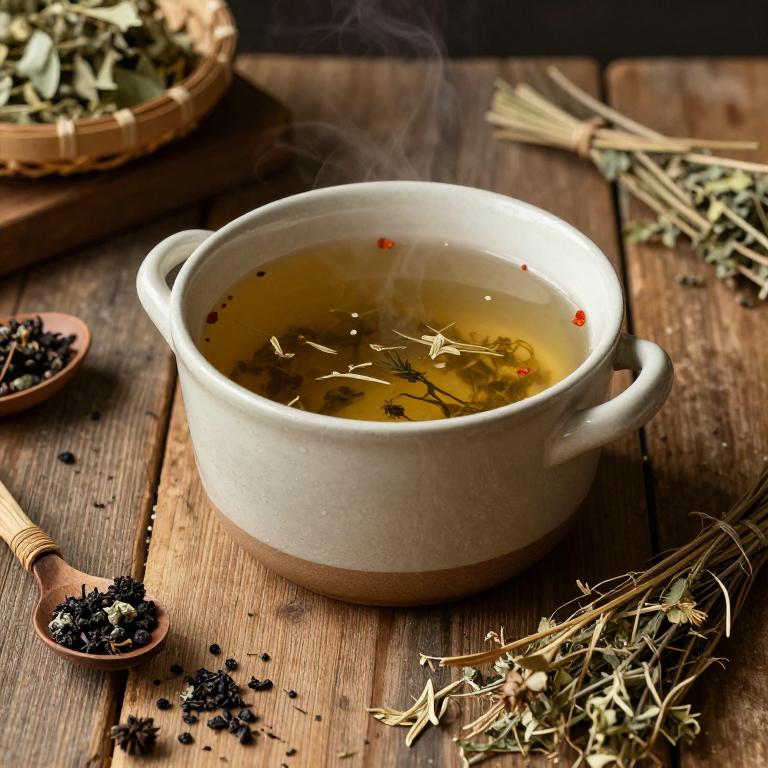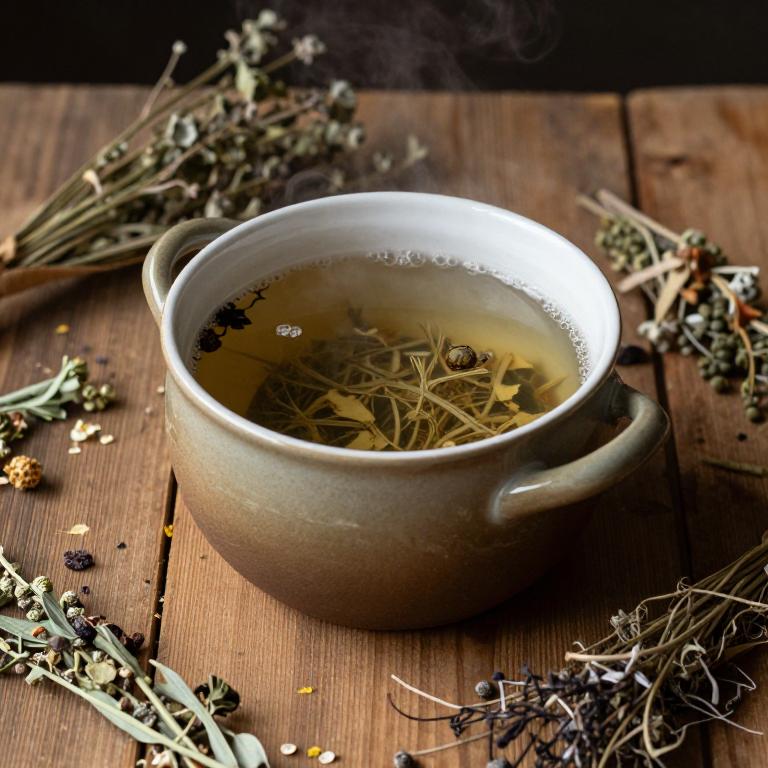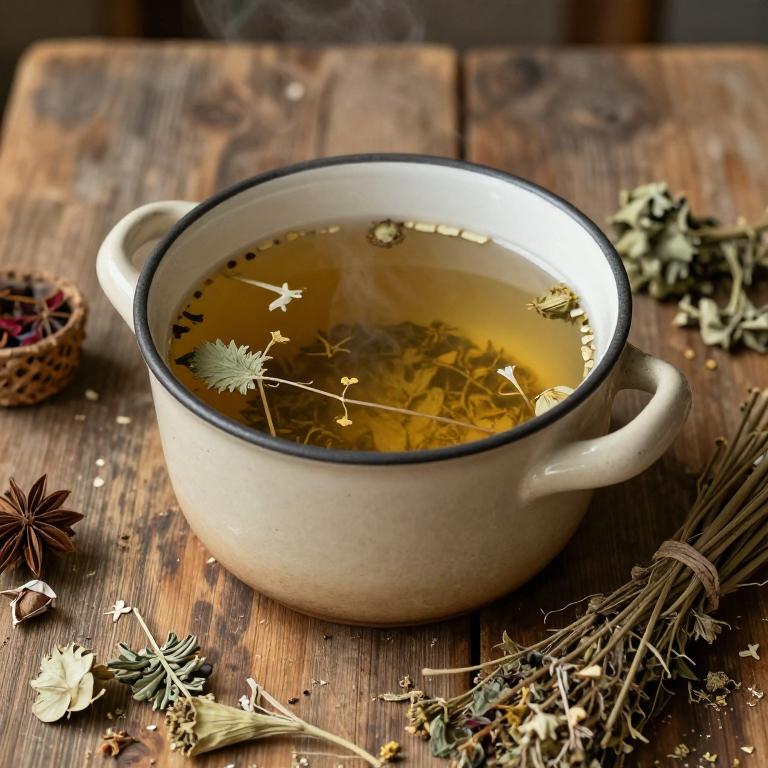10 Best Herbal Decoctions For Fever

Herbal decoctions have been traditionally used for treating fever by harnessing the antipyretic and anti-inflammatory properties of various plants.
Common herbs such as willow bark, ginger, and echinacea are often included in these preparations due to their ability to reduce body temperature and alleviate symptoms. To prepare a decoction, the dried herbs are simmered in water for an extended period to extract their active compounds. This method allows for the gradual release of medicinal properties, making it effective for both mild and persistent fevers.
While herbal decoctions can be a natural alternative to pharmaceuticals, it is advisable to consult a healthcare professional before use, especially for prolonged or high fevers.
Table of Contents
- 1. Echinacea (Echinacea purpurea)
- 2. Sweet wormwood (Artemisia annua)
- 3. St. john's wort (Hypericum perforatum)
- 4. Black elderberry (Sambucus nigra)
- 5. Thyme (Thymus vulgaris)
- 6. Salvia (Salvia officinalis)
- 7. Ginger (Zingiber officinale)
- 8. Kudzu (Pueraria lobata)
- 9. Yarrow (Achillea millefolium)
- 10. Parsley (Petroselinum crispum)
1. Echinacea (Echinacea purpurea)

Echinacea purpurea, commonly known as purple coneflower, is a popular herbal remedy traditionally used to support immune function and alleviate symptoms of colds and flu.
While it is often used preventively, some studies suggest that echinacea may also have potential in reducing the duration and severity of fever when used alongside conventional treatments. Herbal decoctions made from echinacea roots and leaves are prepared by simmering the plant material in water, allowing the active compounds to be extracted for consumption. These decoctions are believed to possess anti-inflammatory and antipyretic properties, which may help lower body temperature during fever.
However, it is important to consult with a healthcare provider before using echinacea, especially for individuals with allergies or those taking other medications.
2. Sweet wormwood (Artemisia annua)

Artemisia annua, a traditional Chinese herb, has been used for centuries to treat fever and malaria due to its active compound, artemisinin.
Modern research has validated its efficacy in reducing fever by targeting the fever-inducing mechanisms in the body. Herbal decoctions made from artemisia annua typically involve boiling the dried leaves in water to extract the medicinal properties. These decoctions are often used in combination with other herbs to enhance their therapeutic effects.
While generally safe, artemisia annua should be used under medical supervision to ensure proper dosage and avoid potential side effects.
3. St. john's wort (Hypericum perforatum)

Hypericum perforatum, commonly known as St. John's wort, is traditionally used in herbal medicine for its potential therapeutic properties.
While it is more widely recognized for its antidepressant effects, some historical uses suggest it may have been employed to treat fever due to its antimicrobial and anti-inflammatory characteristics. Herbal decoctions of Hypericum perforatum typically involve simmering the dried plant material in water to extract its active compounds. However, modern scientific evidence supporting its efficacy for fever is limited, and its use for this purpose remains largely anecdotal.
It is important to consult a healthcare professional before using St. John's wort, as it can interact with various medications and may not be suitable for everyone.
4. Black elderberry (Sambucus nigra)

Sambucus nigra, commonly known as elderberry, has been traditionally used in herbal medicine for its potential antiviral and immune-boosting properties.
Herbal decoctions made from the berries, flowers, or leaves of Sambucus nigra are often prepared by simmering the plant parts in water to extract their active compounds. These decoctions are believed to support the body's defenses against viral infections, including those that may cause fever. However, it is important to note that while some studies suggest elderberry may reduce the duration and severity of cold and flu symptoms, its efficacy for fever specifically remains under investigation.
As with any herbal remedy, it is advisable to consult a healthcare professional before use, especially for individuals with chronic conditions or those taking other medications.
5. Thyme (Thymus vulgaris)

Thymus vulgaris, commonly known as thyme, has been traditionally used in herbal medicine for its antiseptic and fever-reducing properties.
Herbal decoctions made from thyme leaves and flowers are often prepared by simmering the dried plant material in water for several minutes to extract its active compounds. These decoctions are believed to support the immune system and may help alleviate symptoms of fever by promoting perspiration and reducing inflammation. The essential oils in thyme, particularly thymol, contribute to its therapeutic effects.
While thyme decoctions can be a natural remedy for mild fevers, it is important to consult a healthcare professional before use, especially for prolonged or high fevers.
6. Salvia (Salvia officinalis)

Salvia officinalis, commonly known as common sage, has been traditionally used in herbal medicine for its potential therapeutic properties, including its use in managing fever.
Herbal decoctions made from dried sage leaves are prepared by simmering the leaves in water, allowing the active compounds to infuse into the liquid. These decoctions are believed to have antiseptic and anti-inflammatory effects, which may help reduce fever symptoms by supporting the body's immune response. While sage is often used as a complementary therapy, it should not replace professional medical treatment for fever, especially in severe cases.
Due to its mild nature, sage decoctions are generally considered safe for short-term use, though caution is advised for pregnant women and individuals with certain health conditions.
7. Ginger (Zingiber officinale)

Zingiber officinale, commonly known as ginger, has been traditionally used in herbal medicine for its therapeutic properties, including its ability to reduce fever.
Ginger contains bioactive compounds such as gingerols and shogaols, which possess anti-inflammatory and antipyretic effects. A ginger herbal decoction can be prepared by boiling fresh or dried ginger root in water, allowing the active compounds to infuse into the liquid. This decoction is often consumed orally to help lower body temperature and alleviate symptoms associated with fever.
While ginger is generally safe, it is advisable to consult a healthcare professional before using it as a treatment, especially for persistent or high fever.
8. Kudzu (Pueraria lobata)

Pueraria lobata, commonly known as Kudzu, has been traditionally used in herbal medicine for its various health benefits, including its potential role in managing fever.
Herbal decoctions made from the roots of Pueraria lobata are often prepared by boiling the dried root in water for an extended period to extract its active compounds. These decoctions are believed to have antipyretic properties, helping to reduce body temperature by promoting sweating and detoxification. The primary active components, such as isoflavones and puerarin, are thought to contribute to its fever-reducing effects.
However, while traditional use suggests efficacy, modern scientific research is still ongoing to fully understand its mechanisms and safety in treating fever.
9. Yarrow (Achillea millefolium)

Achillea millefolium, commonly known as yarrow, has been traditionally used in herbal medicine for its antipyretic properties, making it a potential remedy for fever.
The preparation of a decoction involves simmering the dried aerial parts of the plant in water for an extended period to extract its active compounds. Yarrow contains compounds such as flavonoids and essential oils that may help reduce body temperature by promoting sweating and improving circulation. However, while some historical use suggests its efficacy, modern scientific evidence supporting its use for fever is limited.
It is important to consult a healthcare professional before using yarrow decoctions, especially for prolonged or high fevers, to ensure safety and proper treatment.
10. Parsley (Petroselinum crispum)

Petroselinum crispum, commonly known as parsley, has been traditionally used in herbal medicine for its various therapeutic properties, including its potential to alleviate fever.
The leaves and seeds of this plant contain compounds such as apiol and limonene, which may have antipyretic effects by influencing the body's temperature regulation mechanisms. Herbal decoctions made from fresh or dried parsley can be prepared by simmering the plant material in water, allowing the active compounds to be extracted into the liquid. These decoctions are often used in supportive care to reduce fever symptoms, though they should complement, not replace, conventional medical treatments.
It is important to consult a healthcare professional before using parsley decoctions, especially for individuals with chronic illnesses or those taking medications.